- Home
- Q. Patrick
Hunt in the Dark Page 2
Hunt in the Dark Read online
Page 2
Many of Rickie and Hugh’s stories in Hunt in the Dark and Other Fatal Pursuits are far removed from Hugh’s rarefied world of shining, richly rewarded achievement, in the way of noir capturing, rather, some of the darkness which in his later years Rickie often felt in his own melancholy heart, never more bleakly than in “This Way Out,” when the narrator observes: “During the evening there had been moments of wild racing hope. Moments when he thought he was on top and could thumb his nose at doom. They hadn’t been real of course….He’d been licked from the start.” In this latest volume from the devilishly good Crippen & Landru, cross over for a few twilight hours to the dark side of life with Rickie Webb and Hugh Wheeler—if you dare!
Curtis Evans thepassingtramp.blogpsot.com
The Frightened Landlady
I
FEAR IN HER EYES
The affair ended with a brutal murder and the unearthing of another crime so fantastic in its twisted abnormality that I cannot help wondering whether I am violating the ethics of my profession in setting it down. The ending, I repeat, was fantastic and rather beastly. And yet the beginning was so simple, so routine and—though I hesitate to use the word — almost humorous. It all started when a small, shabbily respectable woman marched into Doctor Hammond’s consulting office. She was well over sixty, and at first there seemed nothing to set her apart from the other patients, unless it was that she obviously possessed the vitality of a woman much younger than her years. All her movements were quick and alert. She glanced around her and perched herself on the extreme edge of a chair like an old-fashioned, untidy doll.
“I want to see Doctor Hammond, young man,” she snapped. I explained that Doctor Hammond was away on vacation and that I was taking care of his patients. She glanced at me suspiciously as though she were sizing me up in her mind. Then she
laughed—a high, rather startling laugh.
“Well. Doctor Westlake, the last time I went to a doctor was thirty years ago. You were running about in short pants then.” Again her laugh rang out almost defiantly. “But I’m sick now, and I want you to tell me what’s the matter.”
At the advanced age of thirty-eight, I found it flattering to be treated as a boy. I was prepared to like this indomitable little woman.
“What’s the trouble. Mrs.—”
“Bellman. Eva Bellman,” Her voice suddenly faltered. “And don’t ask me what’s the matter. Find out for yourself.”
She did not look like an ill woman, nor did she seem the type that goes in for malingering or invalidism. I gave her a thorough physical examination. Except for a slight systolic murmur and rather low blood pressure, I could find nothing wrong. I told her so. For some reason, this reassurance seemed to aggravate rather than calm her.
“You young doctors!” she exclaimed with curious vehemence. “Full of newfangled nonsense! If you can’t find out what’s the matter, I shall have to go to someone who can. You see, whatever you say, I must be sick.” She laughed—this time more shrilly than before. “You—you didn’t examine my eyes, did you?”
“I’m not an eye specialist, you know.”
“You must look at them.” There was a note of finality in her voice. “If it’s nothing else, it’s my sight.”
I gave her some simple tests with colors and letters. Then for the first time since she entered, I looked straight into the small, deep-set eyes. I could see nothing wrong—that is, nothing organically wrong. But as I examined those dilated pupils with their border of faded iris, it was as though a veil were lifted, and for an instant I saw into her very soul. In that brief examination, I realized that I was dealing with a case which did not belong within the normal sphere of medical activities. There was no doubt as to what was wrong with Mrs. Bellman. She was afraid—blindly, desperately afraid.
My expression must have betrayed my surprise at this discovery, for she exclaimed abruptly.
“What is it, young man? There is something wrong, isn’t there? Am I going blind?”
Frankly, the case bewildered me. I told her that her eyesight seemed normal and tried to encourage her to talk, hinting that perhaps her nerves or overwork—
“Overwork,” she snapped. “When a woman’s been on her feet fourteen hours a day for thirty years, she gets used to a little work.” She broke off and glanced away. Then she added suddenly, “I’ll tell you why I’m sure it’s my eyes, young man. I’ve seen things—horrible things—things that couldn’t possibly have been real.”
As a doctor, I am used to hysterical women with their dramatics and exaggerations, but there was a basic sanity and matter-of-factness about Mrs. Bellman which had to be taken seriously. Here was no mere old woman’s neurosis. I felt I was on the threshold of something more complex—something far less easy to diagnose.
She was talking rapidly now—talking about herself as if to regain her confidence. It seemed that she owned a rather superior boarding house somewhere downtown. As soon as she mentioned it, a change came over her. She became the very essence of all landladies with their pride in the house, their strict code of respectability and correctness. Yes, she had run No. 12 Potter Street by herself for many years, and hoped to do so for many more. Of course, it was in a very good section of town. There would be no difficulty in selling out if she wanted to. Why, only the other day she had had a very satisfactory offer. But she would never consider retiring.
“I’ve always been a working woman, Doctor Westlake,” she said, twisting a plain gold wedding ring on her finger. “And I hope to go on working as long as my two legs carry me. That is, provided I keep my health. But if things don’t get better—”
I could tell that she was pathetically eager to confide in me and yet afraid lest I should fail to believe her. Again the strange laugh as she leaned impulsively forward.
“It began a few weeks ago, young man. At first it was just little incidents and I was too busy to pay any attention. Then things began to happen. Well, there just wasn’t any explanation. It was as if the devil himself was playing spiteful tricks on me.”
Her small, deep-set eyes met mine for a moment and then flicked away. “It was the flowers that I noticed first.”
I nodded sympathetically.
“I hate zinnias!” she exclaimed with seeming irrelevance. “Nasty things—the color of blood! I know I never bought them. You see. I always have a vase of flowers on the table in the vestibule to keep it fresh and dainty. One morning I bought some lovely gladioluses from a man on the street. I set them up in the hall and went to my room to take off my hat. When I went back to the hall, those flowers had changed. They were zinnias. I stared at them and just couldn’t believe my eyes. I was so worried that I ran out to the street to find the flower man. He’d gone, but when I got back to the hall,”—she paused and then whispered—”they were gladioluses again. And yet I had seen those zinnias. I swear I had.”
To me, this incident seemed amusing rather than sinister. “And that’s only the beginning, Doctor Westlake. The very
next day something else happened. In my bedroom, I have a photograph on the wall—an old wedding group of myself and my husband.” For an instant her eyes flashed with an expression other than fear. “I turned him out of the house five years ago,
but I still keep the photo there. Guess I never bothered to take it down. Well, on Wednesday, I was tidying up when I happened to glance at the picture. It—it had changed.” The laugh rang out again suddenly. “It had changed to a photograph I had seen in the paper —a nasty picture of a dead woman all smashed up after a motor accident.
“I touched it. I know I touched it. Then Mrs. Brown called me upstairs saying the mosquitoes had got into her room. I was away about twenty minutes fixing one of hall screens, but, when I got back, there was the old wedding group just like it had always been.”
I must have been looking at her in a rather tactless manner for she added immediately: “And don’t think I drink, young man. I haven’t so much as touched a glass of b
eer since I—since my husband went. I hate the stuff.”
I started to ask a question, but a gesture of the thin arm stopped me.
“Ever since, it’s been going on. Things changing and then changing back again before my eyes. I’m not the fanciful sort. And I’m perfectly capable of running my own house even if I do have tempting offers. But I can’t tell any more what’s real and what isn’t. I see ornaments and pieces of furniture in the wrong place—and when I come to move them back, they’re already there.”
Her hands were fluttering around the meager bosom, “But it was yesterday that it happened—the thing that made me decide I had to come to a doctor.” Her lips were tightly pressed together, almost invisible. “There’s a canary by the desk in the hall. It’s been there for years, and no one pays much attention to it except Miss Clymer who feeds it and gives it water. Yesterday afternoon when I’d got through with lunch, I went to my room to rest. I crossed to the bed.” She glanced up fiercely. “And you must believe this. I saw that canary stabbed with my paper knife and pinned to the pillow. It was bright yellow and there was a long trickle of blood on the slip.”
She looked down. “I ran along the passage to the hall—and, oh, of course, you know what I found. The canary was still in the cage, singing its head off. Miss Clymer was there giving it a bit of sugar. She—she saw me and started to talk about her hot-water faucet being loose.”
“And when you got back to your room?”
“Yes, the canary wasn’t there. The paper knife was on my table where it always is. And—and there was no blood on the pillow slip, young man.”
She broke off abruptly. There was no hysteria in this sudden silence.
For a moment I did not speak.
“You’ve told your lodgers about this, Mrs. Bellman?”
“Of course not. What do you suppose they’d say? Besides, nothing ever stays the same. I don’t believe I saw those things at all. I’m sure—I know it’s my eyes.”
I was equally sure it was not.
“I don’t doubt for a moment that you saw what you say you saw, Mrs. Bellman. Surely, the solution is obvious. Someone in the house is doing it—one of your boarders—practical jokes.”
Instantly I came up against the landlady in her. I could tell exactly what my patient was thinking. Hers was a respectable house. It was impossible to suspect one of her lodgers. Did not she always look prospective tenants over personally? She gazed at me coldly.
“Why should they?” she asked.
That was a question which seemed difficult to answer, but I continued with my argument.
“Boarding houses, you know—people get peculiar. Isn’t there someone you might suspect of having a grudge against you?”
“Grudge! I guess they all have grudges. Never knew a boarder that didn’t. I’ve been renting out rooms forty years, young man, and I know boarders gossip and complain, but they don’t do things like that. Not at my house. They know they get their money’s worth at 12 Potter Street. Why, Miss Clymer—she’s always behind with the rent. And I don’t turn her out, do I? And Mr. Washer, saying he has a right to play that piano of his all hours of the night as though no one else was trying to sleep!”
I encouraged her to talk, hoping to find in her random remarks a clue to these strange happenings.
“Yes,” she continued, “and those two Furnivall women complaining about the meals or the service. But I always say that you can’t expect the Ritz for twelve dollars a week inclusive. The Browns—they’re the only good tenants, but they’re always asking for my best suite. As for that Davenport girl, painting her lips and nails, and running in and out of men’s bedrooms. And there’s Mr. Jay. He’s a fresh boy, but that’s only when I complain about his chemistry and the smells he makes about the house.” She broke off suddenly as though she had been caught out in depreciating the reputation of the house. “But they wouldn’t do a thing like that. No, Doctor Westlake.”
I saw it was merely a waste of time to try to shake her convictions on this point. There seemed nothing for it but to tell her to take things a bit easy and gave her a prescription for a boric eyewash. She snatched it eagerly and put it in her dilapidated pocketbook.
“Well, Mrs. Bellman.” I said, as I crossed with her to the door, “you can take it from me that you are perfectly sound physically and—er—mentally. My suggestion is that someone is arranging all these things to frighten you. If anything else happens, please call me up, and, if necessary, we can put the police onto them.”
She did not seem to hear the last part of my sentence. She had turned and was staring unseeingly across the room.
“Of course,” she muttered, “if she was still there, I could understand.” There was a strange emphasis on the word: “she.”
“But it couldn’t be Agnes. Mrs. Salt took her to Arizona to try and cure her, poor thing.”
Then her mood seemed to change and she broke into genuine laughter for the first time.
“Jo—that soft, spineless, no-good Jo. He couldn’t. No, it’s impossible.”
Before I had time to question her, she was gone. I saw her back as she hurried into the street—a thin, erect back carrying so defiantly its burden of bewilderment, suspicion and fear.
II
A COCK-AND-BULL STORY?
Doctor Hammond’s practice was not a large one. A few more patients trickled into the office after Mrs. Bellman’s departure, but they were all routine cases. When lunch time came, I found myself still thinking of the frightened landlady. The case intrigued me. Possibly my recent connection with the unpleasant series of murders near my home in Kenmore had given me a taste for the bizarre. At any rate, I gave way to an impulse and called up my old friend Cobb of the Grovestown police.
Without violating professional confidences, I told him something of my interview with Mrs. Bellman, pleaded vulgar curiosity, and asked him if he knew anything about her boarding house at No. 12 Potter Street.
Cobb is a very methodical individual with a prodigious memory. He considered a moment and then said:
“Come to think of it, I do remember a little thing—just one of those cases of a frightened, hysterical woman.”
“Frightened?” I echoed swiftly “You mean Mrs. Bellman?”
“No, sir. It was one of her neighbors. That Bellman woman’s got her head screwed on pretty tight. Nothing could scare her.”
I could have contradicted him, but I didn’t. “What was it all about?” I asked.
“Just a cock-and-bull story. Sometime last spring this woman came running into the police station and said her little boy had been scared half out of his wits by something he saw in one of the windows across the way. The woman said she caught a glimpse of it, too.”
“You mean something in No. 12 Potter Street?”
“Yeah. She described it to me, but she was all het up and didn’t get her story straight. What she said first didn’t make sense. She accused Mrs. Bellman of running a sort of menagerie—swore she’d seen a queer-looking animal in one of the upper rooms. A kind of baboon, she said, only it was much too large and the face was sort of bluish-purple.”
“She must have been crazy.”
“No, she calmed down after a bit and admitted it might have been a person. There was no hair on the face, but her little boy said he had seen it crawling around on its hands and knees. Once, she swore, it sprang at the window as though it was catching flies or something. Heaven knows why I remember these darn things.” I thought of Mrs. Bellman sitting opposite me, so small, so rigid and so afraid. Then for some reason or other, I remembered one of her last remarks: “If she was still there. But it couldn’t be Agnes.”
“What did you do?” I asked Cobb.
“One of my men went round and talked to Mrs. Bellman. She was perfectly sensible. Said that one of her lodgers had a sick child. She promised to have them keep the shades drawn.”
“And you heard nothing more?”
“No.”
Cobb seemed bored with the whole affair. “What you so interested for, anyway? We get that sort of case coming in every day.”
“I wonder,” I murmured and rang off.
I sat a moment, turning over in my mind another of Mrs. Bellman’s remarks. “I’ve seen things—horrible things— things which couldn’t possibly have been real.” It looked as though there were other people in Potter Street who had seen strange things too.
III
THE GRIM APARTMENT
Doctor Hammond was a very old friend of mine, and it had been out of friendship alone that I had offered to look after his practice while he snatched a much deserved vacation. I found my life at the Regent Hotel extremely dull. My own house in Kenmore was only twenty miles away, but I had shut it up for the summer, and my eight-year-old daughter, Dawn, was away at the shore with friends. At this stage I think it was largely a sense of boredom that kept alive my interest in Mrs. Bellman. I am sure it was the depressing anecdotes of the traveling salesmen at the Regent that finally drove me to visit her.
There was still a month before Doctor Hammond returned. A month was long enough to make it worth my while to rent an apartment, and, judging from what I had heard, No. 12 Potter Street seemed interesting. Dreary it might be—but certainly not dull.
By five o’clock next evening, work at Doctor Hammond’s office was over for the day. I strolled through the late August sunlight to Potter Street, which was located in one of the older sections of the town. The buildings were tall and dignified and, like Mrs. Bellman, possessed an air of decayed respectability. No. 12 was typical of the street, except perhaps for a rather exaggerated neatness. Any visions I might have had of a sinister, cob-webbed mansion were immediately dispelled. The windows were painted a fresh green, and their muslin curtains were bright and crisp. Mrs. Bellman’s troubles, I reflected, had not made her neglect her duties as a neat, progressive landlady.

 Death Goes to School
Death Goes to School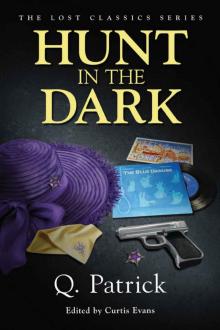 Hunt in the Dark
Hunt in the Dark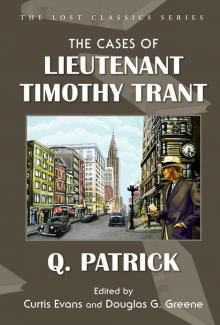 The Cases of Lieutenant Timothy Trant (Lost Classics)
The Cases of Lieutenant Timothy Trant (Lost Classics)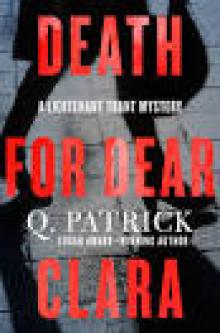 Death for Dear Clara
Death for Dear Clara S.S. Murder
S.S. Murder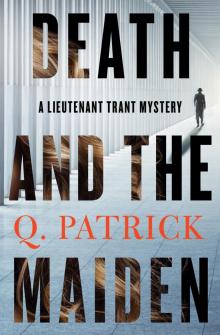 Death and the Maiden
Death and the Maiden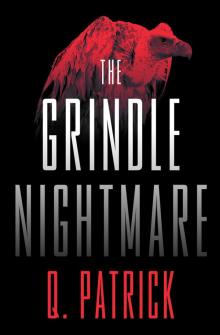 The Grindle Nightmare
The Grindle Nightmare Cottage Sinister
Cottage Sinister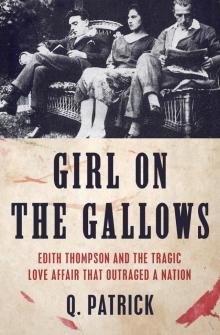 The Girl on the Gallows
The Girl on the Gallows